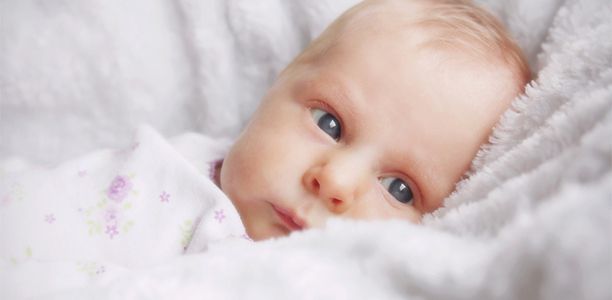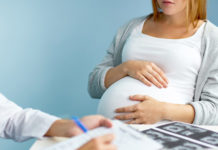Colds cause similar symptoms in babies as they do in children and adults – bothers like blocked noses, coughing and sneezing. Babies usually become sick with a cold very quickly and their symptoms tend to be worst 2-3 days after the colds starts. Fortunately they usually clear up without serious complications within 2 weeks, though some symptoms like a cough might linger for 3-4 weeks.
However, there are some more serious symptoms that can cause health complications like ear infections for your baby, and some symptoms which may also indicate your baby has a more serious condition than the common cold. While a cold itself doesn’t need to be seen by a doctor, parents sometimes need to get their babies checked to make sure the coughs and sniffles are ‘just a cold’ and not something more serious.
Common cold symptoms in babies 3-12 months old
A blocked or runny nose is usually the first sign that your baby has a cold. The discharge from your baby’s nose is usually transparent at the beginning of a cold but later becomes thicker and a greenish or yellowish colour. A blocked nose can be particularly uncomfortable for a baby, because it makes it difficult for them to suckle or bottle feed. When you consider how tiny your baby’s nose is, you don’t need to be Einstein to work out that it doesn’t take much to block it up.
Other symptoms that often affect babies when they have a cold include:
- A slight fever (< 38oC);
- Sneezing;
- A cough;
- Red eyes;
- Hoarse voice;
- Reduced appetite;
- Irritability; and
- Trouble sleeping.
These symptoms can be difficult to cope with, but rest assured that they indicate a common cold which will take care of itself and is unlikely to result in complications. In babies 3-12 months of age, these symptoms will usually resolve within two weeks without needing treatment from the doctor. If your baby seems to be coping with their symptoms without medicine, wait and see what happens. It’s likely that baby will be on the road to recovery before you know it.
Complications of colds in babies 3-12 months old
Sometimes common colds can lead to more serious infections, including:
- Ear infection, also called otitis media. This is a very common complication of the common cold. It may occur if a virus or bacteria enters the child’s ear canal;
- Wheezing, a symptom most commonly associated with asthma, may develop, even in children who are not asthmatic. (If your child does have asthma, a cold can make wheezing worse);
- Sinus infection or inflammation, often called sinusitis. It may occur if the cold symptoms do not resolve;
- Secondary infection of the respiratory tract, which are often bacterial and include pneumonia, croup, bronchiolitis and strep throat:
- Bronchiolitis: a chest infection most common in babies less than six months old, but also affecting older babies. It is caused by a virus and begins with cold-like symptoms (e.g. runny nose and cough). Symptoms may make it difficult for your baby to breathe or eat and are usually worst on the second or third day after infection;
- Croup: which causes a barking cough;
- Influenza: which is similar to a cold but more serious;
- Pneumonia: which may produce fever and cough accompanied by breathing difficulties (but not wheezing);
- Strep throat: which usually causes a sore throat and fever without a cough. Pus on the tonsils is a another sign of strep throat but is more common in children three years and older.
- Whooping cough (pertussis): which may cause babies to have sudden outbursts of coughing. Vomiting is common. Those under six months of age are unlikely to have the whooping part of the cough, but they may still have the illness we call whooping cough.
Your baby needs to see a doctor and may need to be admitted to hospital if they develop a secondary infection.
What other illnesses cause these symptoms in babies 3-12 months old?
 Many of the symptoms of colds (e.g. coughing) are also symptoms of other diseases, including:
Many of the symptoms of colds (e.g. coughing) are also symptoms of other diseases, including:
- Hayfever: however this allergic disease is unlikely in babies. Generally children under three years of age do not have allergies like hayfever.
- Asthma: which is often associated with coughing during the night;
- Gastro-oesophageal reflux disease: which may cause babies to cough while feeding or when placed in certain positions (e.g. reclining).
- Chronic respiratory disorders: if cough symptoms occur in a child who is experiencing developmental delays, for example have not grown as much as they should have for their age.
- Tuberculosis: if cough symptoms get worse over time. Weight loss is also common in this situation. The child may also have night sweats and cough up blood in addition to their cough.
In babies aged 3-12 months, teething may also produce symptoms which can be confused with cold symptoms. Babies often get their first tooth around six months of age and other teeth start to break through the gums in the following months. Teething can make babies irritable and cranky and produces symptoms of the mouth such as drooling and swollen gums, even before teeth start to break through.
Occasionally babies also get a slight fever while teething. While the symptoms of teething are a bit different to cold symptoms, parents may confuse them because they can’t see a tooth. Remember that symptoms might be teething, even if you can’t see a tooth. However if teething is the cause of your baby’s symptoms there will be other signs. For example, your baby will probably be trying to chew on just about anything they can get their hands on.
How long do baby colds last in 3-12 month olds?
When a baby gets a cold their immune system needs time to start fighting against the virus which is causing the cold. Usually the symptoms of baby colds take about a 1-2 weeks to resolve. However, colds sometimes develop into more serious illnesses like croup or pneumonia, and in this case the symptoms will continue for longer and you must go see a doctor.
How will a cold affect my 3-12 month old baby?
Colds are unpleasant at any age and can cause significant distress for babies and their parents. Baby cold symptoms like a blocked nose can interfere with feeding your baby as it may make it difficult for them to suckle or bottle feed. If your baby is not feeding properly they may become dehydrated because they are not getting enough fluid. Colds can also interfere with baby sleep, and that will probably interfere with the rest of the family getting a good night’s sleep. As bothersome as they may be, if your baby just has a cold you can rest assured that it will not have any serious effects on their overall health.
References
- Mayo Clinic. Common Cold in Babies- Symptoms. 2010. (cited 5 May 2013). Available from: (URL Link)
- Farrer Cold and flu in Children. South African Pharmacists Assistant. 2013; 13(1): 16-17. Available from: (URL Link).
- Mayo Clinic. Guide to your baby’s first year. Good Books. Intercourse, United States. (Full text).
- Mayo Clinic. Common Cold in Babies- Complications. 2010. (cited 5 May 2013). Available from: (URL Link).
- Curtis GB, Schuler J. Week 10. In Your baby’s first year- week by week. 3rd 2010. De Capo Press. (Full text).
- Mayo Clinic. Common cold in babies- Risk Factors. 2010. (cited 5 May 2013). Available from: (URL Link).
- The Royal Children’s Hospital Melbourne. Bronchiolitis. 2013. (cited 12 may 2013). Available from: (URL Link).
- Sung V, Cranswick N. Cough and cold remedies for children. Australian Prescriber. 2009. 32: 112-4. Available from: (URL Link).
- Canadian Paediatric Society Infectious Diseases and Immunization Committee. Colds in children. 2005. Available from: (URL Link).
- Shields MD, Bush A, Everard ML, et al. Recommendations for the assessment and management of cough in children. Thorax. 2008; S3: 1-15. Available from: (URL Link).
- Choby Diagnosis and treatment of streptococcal pharyngitis. Am Fam Phys. 2009; 79(5): 383-90. Available from: (URL Link).
- American Academy of Pediatrics. Caring for your baby and young child- birth to age 5- the complete and authoritative guide. 5th SP Shelov & T Altman. Random House. USA. (Full text).
- Snellman L, Adams W, Anderson G. et al. Institute for Clinical Systems Improvement. Diagnosis and Treatment of Respiratory Illness in Children and Adults. Updated January 2013. (cited 17 May 2013). Available from: (URL Link).
- Best practice New Zealand. Cough in Children. Best Practice Journal. 2010; 29: 20-29. Available from: (URL Link).
More information on colds in 3-12 month old babies
 |
For more information about baby colds and their causes, see Baby colds. |
 |
For information about which babies are more likely to get colds and how to prevent baby colds, see Baby cold prevention. |
 |
For more information about when to take a baby with a cold to the doctor, see When to see a doctor. |
 |
For more information about how to comfort and look after for your baby when they have a cold, see Caring for babies with colds. |
 |
For more information about simple measures you can take to relieve the symptoms of your baby’s cold (and medicines you should avoid), see Baby cold remedies. |
 |
For a quick reference guide to baby colds, see Baby colds: 10 tips for parents. |



 (10 votes, average: 4.50 out of 5)
(10 votes, average: 4.50 out of 5) 






